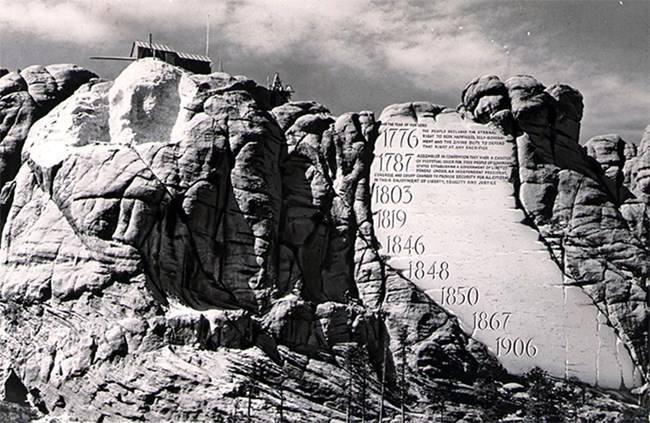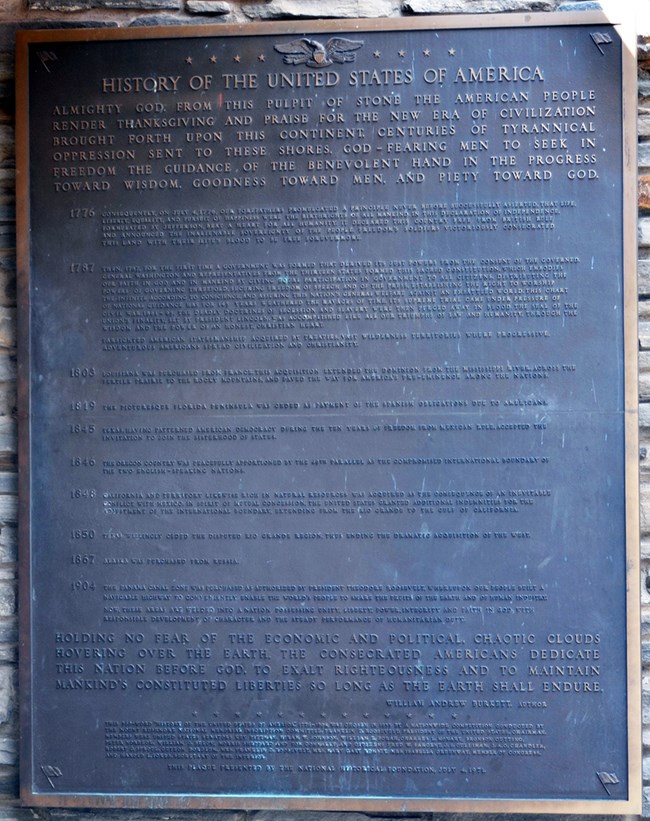
Plans For An InscriptionOriginal plans for the carving of Mount Rushmore included a large inscription called the Entablature. The sculptor of Mount Rushmore, Gutzon Borglum, intended to carve the Entablature in an area shaped like the territory of the Louisiana Purchase using large, three-foot tall letters.Carving The EntablatureThe Entablature was to be a brief history of the United States, symbolized by Washington, Jefferson, Roosevelt and Lincoln, carved beside the four faces. The Entablature would emphasize that Mount Rushmore was a national memorial, commemorating the first 150 years of the United States, not just the lives of the four great men.The Entablature was begun in 1930, when the year 1776 was carved into the eastern side of the mountain. However, in 1934, due to inconsistencies in the rock, the Thomas Jefferson figure was relocated from Washington’s right to Washington’s left. As a result of the recomposition, the Entablature location had to be used for the Lincoln figure. Borglum also concluded that the words on the Entablature were going to be too difficult to read from below. Thus, it was decided that the inscription of historical events would go inside the Hall of Records, a room behind the sculpture, rather than on the front of the mountain. Gutzon Borglum died in 1941 before plans for the inscription were finalized. 
NPS The Essay ContestInitially, Calvin Coolidge was to write the history of the United States that would be carved on the Entablature, but he and Borglum disagreed on how the history should be worded. Calvin Coolidge died in 1933 before any definite wording was finalized. A young Nebraskan named William Andrew Burkett, triumphed in the college-age category. On July 4, 1971, Burkett donated a bronze plaque of his award-winning essay, written in 1934 while attending Omaha University Law School. The plaque now hangs on the Borglum View Terrace at the memorial. His essay is below: Almighty God, from this pulpit of stone the American people render thanksgiving and praise for the new era of civilization brought forth upon this continent. Centuries of tyrannical oppression sent to these shores, God-fearing men to seek in freedom the guidance of the benevolent hand in the progress toward wisdom, goodness toward men, and piety toward God. 1776 Consequently, on July 4, 1776, our forefathers promulgated a principle never before successfully asserted, that life, liberty, equality, and pursuit of happiness were the birthrights of all mankind. In this declaration of independence beat a heart for all humanity. It declared this country free from British rule and announced the inalienable sovereignty of the people. Freedom’s soldiers victoriously consecrated this land with their life’s blood to be free forever more. 1787 Then, in 1787 for the first time a government was formed that derived its just powers from the consent of the governed. General Washington and representatives from the 13 states formed this sacred Constitution, which embodies our faith in God and in mankind by giving equal participation in government to all citizens, distributing the powers of governing, three fold securing freedoms of speech and of the press, establishing the right to worship the Infinite according to conscience, and assuring this nation’s general welfare against an embattled world. This chart of national guidance has for more than 150 years weathered the ravages of time. Its supreme trial came under the pressure of Civil War, 1861-65. The deadly doctrines of secession and slavery were then purged away in blood. The seal of the Union’s finality set by President Lincoln, was accomplished like all our triumphs of law and humanity, through the wisdom and the power of an honest, Christian heart. Far-sighted American statesmanship acquired by treaties, vast wilderness territories, where progressive, adventurous Americans spread civilization and Christianity. 1803 In 1803, Louisiana was purchased from France. This acquisition extended from the Mississippi River, across the fertile prairie to the Rocky Mountains, and paved the way for America's preeminence among the nations. 1819 In 1819, the picturesque Florida peninsula was ceded as payment of Spanish obligations due to Americans. 1845 In 1845, Texas, having patterned American democracy during the ten years of freedom from Mexican rule, accepted the invitation to join the sisterhood of states. In 1846, the Oregon country was peacefully apportioned by the 49th parallel as the compromised international boundary of the two English-speaking nations. 1848 In 1848, California and territory likewise rich in natural resources was acquired as the consequence of an inevitable conflict with Mexico. In spirit of mutual concession, the United States granted additional indemnities for the adjustment of the international boundary, extending from the Rio Grande to the Gulf of California. 1850 In 1850, Texas willingly ceded the disputed Rio Grande region, thus ending the dramatic acquisition of the west. 1867 In 1867, Alaska was purchased from Russia. 1904 In 1904, the Panama Canal Zone was acquired for our people to build a navigable highway enabling the world's people to share the fruits of the earth and human industry. Now, these eras are welded into a nation possessing unity, liberty, power, integrity and faith in God, with responsible development of character and devoted to the performance of humanitarian duty. Holding no fear of the economic and political, chaotic clouds hovering over the earth, the consecrated Americans dedicate this nation before God, to exalt righteousness and to maintain mankind's constituted liberties so long as the earth shall endure. William Andrew Burkett |
Last updated: January 30, 2023
